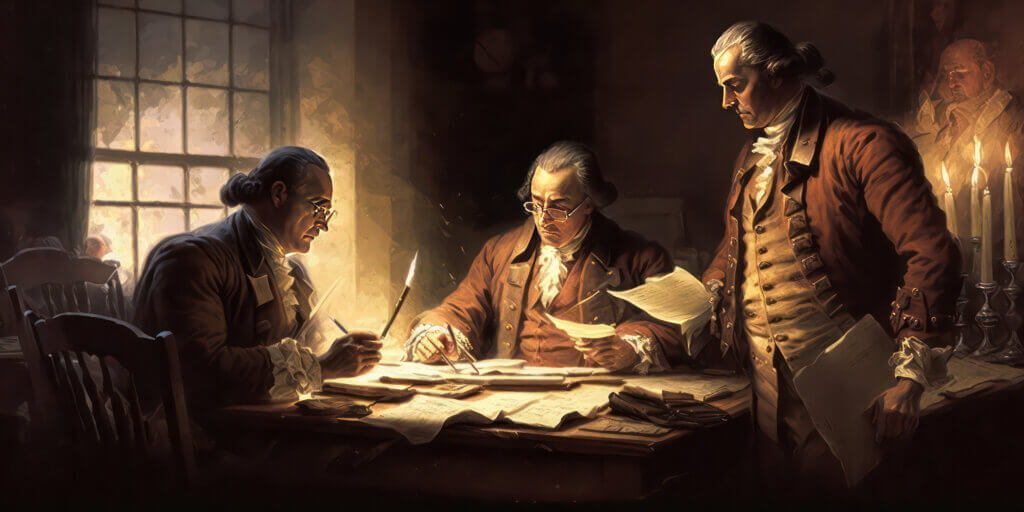“Proclaim liberty throughout the all the land unto all the inhabitants thereof.”
Leviticus 25:10
(Inscribed on the Liberty Bell)
The days ahead were alarming and dangerous for the new United States of America on her first Fourth of July. After two days of debating the wording of the proposed separation from Great Britain, the Second Continental Congress took a vote. The ink was still wet on the document when a select committee was appointed to create the Great Seal of the United States.
The member of the Congress thought it especially important to create a seal in order for the infant country to symbolize to the world the founding principles of the country. For such a critical task, the Congress looked to three of the five representatives who had drafted the Declaration of Independence: Benjamin Franklin, John Adams, and Thomas Jefferson.
After several weeks of working separately on a design for the Great Seal, Benjamin Franklin and Thomas Jefferson came back with similar designs. Both Franklin’s and Jefferson’s designs showed the Children of Israel led by God out of Egypt to the Promised Land. Benjamin Franklin’s proposal for the Great Seal comes down to us in his own handwriting:
“Moses standing on the Shore, and extending his Hand over the Sea, thereby causing the same to overwhelm Pharaoh who is sitting in an open Chariot, a Crown on his Head and a Sword in his hand. Rays from a Pillar of fire in the Clouds reaching to Moses, to express that he acts by a Command of the Deity.”
Thomas Jefferson, who had crafted the wording of the Declaration of Independence, proposed a similar image of the Exodus. The founding trio made their proposal for the Great Seal to Congress on August 20, 1776. Franklin’s and Jefferson’s designs were thought too complicated, so a simpler seal was eventually adopted (see back of the dollar bill). But Franklin’s and Jefferson’s designs reflected the Founders’ conviction that the new nation had been led and blessed by the God of the Bible.
Eleven years later, the Constitutional Convention was coming apart from bitter debate over difficult and divisive issues. Some delegates even gave up hope and stormed out. When remaining delegates could see no way ahead, an elderly Benjamin Franklin took to his feet and addressed the Convention’s president, George Washington, and the discouraged delegates. James Madison kept meticulous notes of the proceedings and records Franklin’s impassioned plea:
“In the beginning of the Contest with Great Britain, when we were sensible of danger we had daily prayer in this room for the Divine protection – Our prayers, Sir, were heard, and they were graciously answered. All of us who were engaged in the struggle must have observed frequent instances of a superintending providence in our favor…And now have we forgotten that powerful Friend? Or do we imagine we no longer need His Assistance? I have lived, Sir, a long time, and the longer I live, the more convincing proofs I see of this truth – that God governs in the affairs of men. And if a sparrow cannot fall to the ground without His notice, is it possible that an empire can rise without His aid? We have been assured, Sir, in the Sacred Writings, that ‘except the Lord build the house, they labor in vain that build it.’ I firmly believe this; and I also believe that without his concurring aid we shall succeed in this political building no better than the Builders of Babel.”
Today, as our divided country faces difficult and dangerous times, we remember God has led and blessed us from our founding and He will make a way for us, if, if….we will humbly seek Him. Benjamin Franklin was right! “Without His concurring aid we shall succeed in this political building no better than the Builders of Babel.”
A fellow traveler,
Tim



